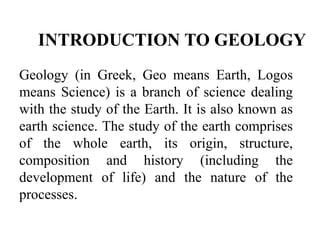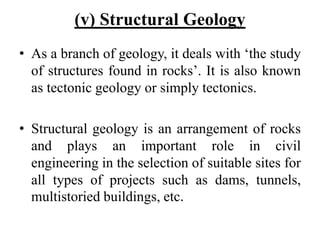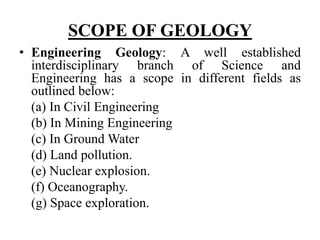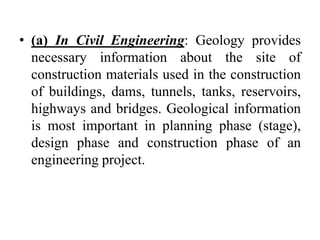1.1 introduction of geology,Branches and Scope of Geology
- 1. DEPARTMENT OF CIVIL ENGINEERING Branches and Scope of Geology Er. Ramprasad Kumawat (M.Tech)
- 2. INTRODUCTION TO GEOLOGY Geology (in Greek, Geo means Earth, Logos means Science) is a branch of science dealing with the study of the Earth. It is also known as earth science. The study of the earth comprises of the whole earth, its origin, structure, composition and history (including the development of life) and the nature of the processes.
- 3. • Geology is a fascinating subject. • Geology feels the pulse of the earth. • Geologists contribute their part to the nation through the discovery of new deposits of rocks and minerals of economic value
- 4. DIFFERENT BRANCHES OF GEOLOGY • (i) Physical Geology (ix) Economic Geology • (ii) Crystallography (x) Mining Geology • (iii) Mineralogy (xi) Civil Engg.Geology • (iv) Petrology (xii) Hydrology • (v) Structural Geology (xiii) Indian Geology • (vi) Stratigraphy (xiv) Resources Engg. • (vii) Paleontology (xv) Photo Geology • (viii) Historical Geology
- 5. (i) Physical Geology • As a branch of geology, it deals with the “various processes of physical agents such as wind, water, glaciers and sea waves”, run on these agents go on modifying the surface of the earth continuously. • Physical geology includes the study of Erosion, Transportation and Deposition (ETD). • The study of physical geology plays a vital role in civil engineering thus: • (a) It reveals constructive and destructive processes of physical agents at a particular site. • (b) It helps in selecting a suitable site for different types of project to be under taken after studying the effects of physical agents which go on modifying the surface of the earth physically, chemically and mechanically.
- 6. (ii) Crystallography • As a branch of geology, it deals with ‘the study of crystals’. A crystal is a regular polyhedral form bounded by smooth surfaces. • The study of crystallography is not much important to civil engineering, but to recognize the minerals the study of crystallography is necessary.
- 7. (iii) Mineralogy • As a branch of geology, it deals with ‘the study of minerals’. A mineral may be defined as a naturally occurring, homogeneous solid, inorganically formed, having a definite chemical composition and ordered atomic arrangement. • The study of mineralogy is most important. (a) For a civil engineering student to identify the rocks. (b) In industries such as cement, iron and steel, fertilizers, glass industry and so on. (c) In the production of atomic energy.
- 8. (iv) Petrology • As a branch of geology it deals with ‘the study of rocks’. A rock is defined as “the aggregation of minerals found in the earth’s crust”. • The study of petrology is most important for a civil engineer, in the selection of suitable rocks for building stones, road metals, etc.
- 9. (v) Structural Geology • As a branch of geology, it deals with ‘the study of structures found in rocks’. It is also known as tectonic geology or simply tectonics. • Structural geology is an arrangement of rocks and plays an important role in civil engineering in the selection of suitable sites for all types of projects such as dams, tunnels, multistoried buildings, etc.
- 10. (vi) Stratigraphy • As a branch of geology it deals with ‘the study of stratified rocks and their correlation’. (vii) Paleontology • As a branch of geology, it deals with ‘the study of fossils’ and the ancient remains of plants and animals are referred to as fossils. Fossils are useful in the study of evolution and migration of animals and plants through ages, ancient geography and climate of an area.
- 11. (viii) Historical Geology • As a branch of geology, it includes “the study of both stratigraphy and paleontology”. Its use in civil engineering is to know about the land and seas, the climate and the life of early times upon the earth. (ix) Economic Geology • As a branch of Geology, it deals with “the study of minerals, rocks and materials of economic importance like coal and petroleum”.
- 12. (x) Mining Geology • As a branch of geology, it deals with “the study of application of geology to mining engineering in such a way that the selection of suitable sites for quarrying and mines can be determined”. (xi) Civil Engineering Geology • As a branch of geology, it deals with “all the geological problems that arise in the field of civil engineering along with suitable treatments”. Thus, it includes the construction of dams, tunnels, mountain roads, building stones and road metals.
- 13. (xii) Hydrology • As a branch of geology, it deals with “the studies of both quality and quantity of water that are present in the rocks in different states”(Conditions). Moreover, it includes: (a) Atmospheric water, (b) Surface water, and (c) Underground water. (xiii) Indian Geology • As a branch of geology, it deals with “the study of our motherland in connection with the coal/petroleum, physoigraphy, stratigraphy and economic mineral of India”.
- 14. (xiv) Resources Engineering • As a branch of geology deals with “the study of water, land, solar energy, minerals, forests, etc. fulfill the human wants”. (xv) Photo Geology • As a branch of geology deals with “the study of aerial photographs”.
- 15. IMPORTANCE OF GEOLOGY FOR CIVIL ENGINEERING • The role of geology in civil engineering may be briefly outlined as follows: 1. Geology provides a systematic knowledge of construction materials, their structure and properties. 2. The knowledge of Erosion, Transportation and Deposition (ETD) by surface water helps in soil conservation, river control, coastal and harbour works. 3. The knowledge about the nature of the rocks is very necessary in tunneling, constructing roads and in determining the stability of cuts and slopes. Thus, geology helps in civil engineering. 4. The foundation problems of dams, bridges and buildings are directly related with geology of the area where they are to be built.
- 16. 5. The knowledge of ground water is necessary in connection with excavation works, water supply, irrigation and many other purposes. 6.Geological maps and sections help considerably in planning many engineering projects. 7. If the geological features like faults, joints, beds, folds, solution channels are found, they have to be suitably treated. Hence, the stability of the structure is greatly increased. 8. Pre-geological survey of the area concerned reduces the cost of engineering work.
- 17. SCOPE OF GEOLOGY • Engineering Geology: A well established interdisciplinary branch of Science and Engineering has a scope in different fields as outlined below: (a) In Civil Engineering (b) In Mining Engineering (c) In Ground Water (d) Land pollution. (e) Nuclear explosion. (f) Oceanography. (g) Space exploration.
- 18. • (a) In Civil Engineering: Geology provides necessary information about the site of construction materials used in the construction of buildings, dams, tunnels, tanks, reservoirs, highways and bridges. Geological information is most important in planning phase (stage), design phase and construction phase of an engineering project.
- 19. • (b) In Mining Engineering: Geology is useful to know the method of mining of rock and mineral deposits on earth’s surface and subsurface. • (c) In Ground Water: Resources development geology is applied in various aspects of resources and supply, storage, filling up of reservoirs, pollution disposal and contaminated water disposal.


















